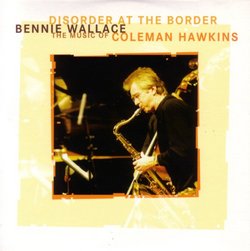Bennie and band roar- looking back while they move ahead
James Lamperetta | Upstate, NY | 03/16/2007
(4 out of 5 stars)
"With each passing year the influence and impact of some of the true pioneers of jazz is absorbed further into the genre's fabric. For instance, those who cite Coltrane as an influence are also indirectly acknowledging the impact of those from who `Trane drew inspiration as well as licks and tricks. As a result, the founding fathers are increasingly being relegated to footnotes for newer generations of jazz fans.
With "Disorder at the Border," saxophonist Bennie Wallace pays tribute to tenor saxophonist Coleman Hawkins. During a career that spanned from the `20s to the `60s, Hawkins' innovations made him one of the founding fathers of modern jazz, yet his legacy today is largely underappreciated.
Using a small big band comprised of six brass- including such luminaries as trumpeter Terrell Stafford, trombonist Ray Anderson, baritone saxophonist Adam Schroeder, alto saxophonists Jesse Davis and Brad Leali- and rhythm section, Wallace presents a rousing program of six tunes associated with "Bean," as Hawkins was known.
Although honoring Hawkins requires looking back, this is far from a nostalgic date. Recorded live at the Berlin Jazz Fest in 2004 with sparkling clarity and great depth, horn riffs punctuate the backdrop spurning soloists to new heights. Furthermore the soloists tackle their time in the spotlight with aplomb which harks back to the day yet is imbued with a wholly modern slant.
Two compositions originate from Hawkins pen, the title-track which kicks off the disc in rousing fashion and "Bean and the Boys" which is served up jam-session style and features some excellent work by Stafford and another killer Schroeder solo which recalls legendary baritone saxophonist Pepper Adams.
Elsewhere the band rips it up on Fats Waller's "Honeysuckle Rose," complete with an alto cutting-contest, and big whoops from Wallace and Schroeder's baritone.
The spirit of Charles Mingus creeps into a rollicking sixteen-minute reading of "Joshua Fit the Battle of Jericho." Here perhaps better than anywhere else the group flexes its muscle- showcasing the powerhouse unit they are while losing none of the nuance or subtlety which is otherwise omnipresent.
Hawkins put "Body and Soul" on the jazz map and here Wallace dismantles it and then reassembles it. Using fragments of the original solo to craft an instrumental statement which culminates in a rousing cadenza, Wallace's tribute here and throughout the disc is both humble and heartfelt."


 Track Listings (6) - Disc #1
Track Listings (6) - Disc #1